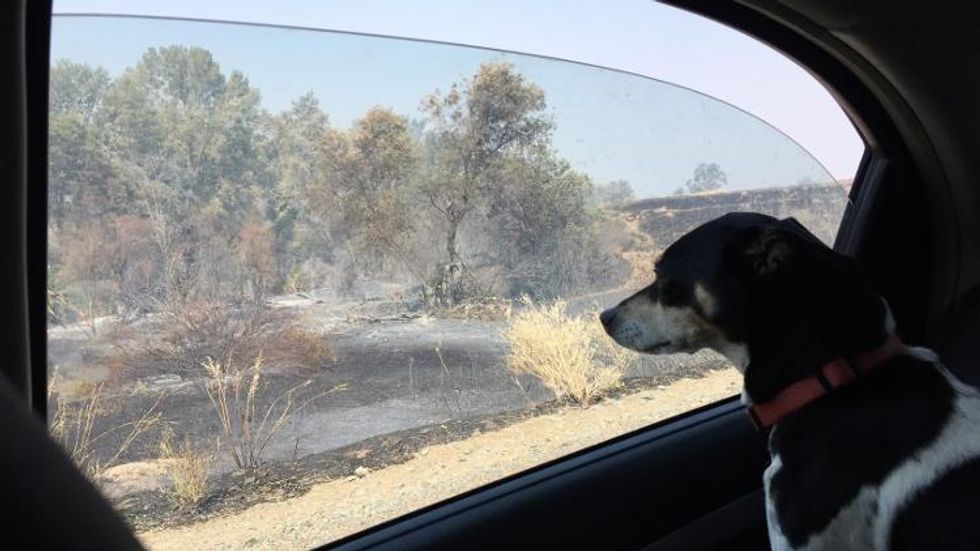State and local officials from across Oregon had alarming news to share this week. "Over 1 million acres have burned -- that's over 1,500 square miles," Gov. Kate Brown, one of only two out governors in the nation, said at a press conference on Friday. "Right now, our air quality ranks the worst in the world."
Wildfires across America's West have burned millions of acres, with California, Oregon, and Washington accounting for nearly half of those acres. In Oregon this past weekend, 500,000 people were under some sort of evacuation order -- nearly 10 percent of the state's population -- displacing tens of thousands and leaving many without homes to go back to.
"As of now we know that 13 women who are a part of our group have lost their homes in the fires," says Lori Warfield and Jean Hanna, board member and founder, respectively, of the nonprofit lesbian organization Wild Womyn. "You lose your home so suddenly that people did not even have a chance to grab a toothbrush. It is destroying the memories that live in that house. It shakes the very earth under their feet." Hanna continues: "Hotels are at full capacity, parking lots are full of fire refugees living in their cars, and the supermarkets are running bare. That is why Wild Womyn is there to hold their hands."
Wild Womyn's mission is to foster community for lesbians and queer women in the Rouge Valley of South Oregon. Immediately after the fire, Wild Womyn went from being a social organization to a fully mobilized advocacy group engaged in crisis interventions for those who lost their homes. The organization has an estimated 150 members showing support through donations of clothes, food, and money.
"We are the most worried about our older members, some who are in their mid-70s who have lost everything. Many of these women live in low-income housing or in mobile home areas that got hit the hardest," Hanna explains. But Lori Johnson, a retired 72-year-old from Phoenix, Ore., one of the towns that no longer exist after the fires, has a different perspective.
"It feels like a new beginning for me and I am not really mourning," says Johnson almost cheerfully. "I saw the smoke coming near us and the smoke was getting darker and darker but I didn't think anything of it, so I went home and decided to take a nap. Right as I woke up from my nap the police came rushing in and told me that I had to get out right away. All I took were my keys and purse. But the women here are so supportive and nurturing and have offered me rooms, food, and clothes. I am excited for this new beginning."
The Oregon fires have killed 10 people with dozens missing, with Oregon's Office of Emergency Management Director Andrew Phelps saying during a press conference, "Oregon needs to prepare itself for a mass fatality incident." As Oregonians face the reality of having to flee their homes, with some living in the cars, and millions being told to stay inside due to "hazardous" or "very dangerous" air conditions, officials have now called this an unprecedented disaster.
To make matters worse, the National Weather Service reported that visibility is a quarter mile or less in some places, making it extremely dangerous to drive and causing additional barriers for the already exhausted firefighters. "Challenges remain for our firefighters, reduced visibility, and rapidly changing conditions continue to make things impossible" fire officials said in a statement on Sunday. However, officials did express some optimism as cooler temperatures, along with moisture in the air, have begun to arrive.
"This weather has helped the firefighters put us in a position to move from just life safety to the offense," said Department of Forestry Fire Protection Chief Doug Grafe during the press conference. "This is positive firefighting weather for three days. It'll continue to next week with more favorable conditions."
With a tumultuous summer of racial justice protests and COVID-19 uncertainties, Scott Stimpson has found himself in the unique situation of being unemployed and unable to breathe the air. "That feeling like you need to be at home again is back" says Stimpson. "Millions of acres are gone, and the fires are forcing people to run for their lives. I have never seen anything like this before."
Stimpson, a member of the LGBTQ+ community, has a unique understanding of how fire, nature, and man intersect with each other in both the best and worst ways. Stimpson, who now works in the Willamette wine industry, and who has a large social media following that highlights his unique lifestyle as a "forager for food," was previously a state park ranger at Estero Bay Preserve State Park in Fort Myers, Fla. After finishing his degree in environmental sciences, Stimpson took a job as a park ranger and wildfire firefighter.
"We expect fires this time of year [in Oregon]; fires come pretty severe this time of year, but not to this degree, but I have heard that this is a long time coming," Stimpson says. "While Oregon is known for its conservation we still have clear cutting and fire suppression going on and have for many years. Fire is not a bad thing, but humans have made it worse."
According to a 2018 report by the U.S. Global Change Research Program, an organization tasked with reporting the effects of global climate change to the president of the United States and Congress every four years, the Northwest has warmed substantially -- nearly 2degF since 1900. And this warming is attributed to human-caused emissions of greenhouse gases. In combination with record winter warmth, much of the Northwest has seen results such as droughts and water scarcity leading to the perfect conditions for the wildfires that are seen today.
"These fires have a much longer impact than people think! You will not be able to get into these places for years," Stimpson says. "This has impacted my ability to forage and has set me back 3-6 months on food when I was supposed to be collecting surplus. I also do not have the additional stream of income that came from giving outdoor foraging tours, only complicating things for me during COVID."
With only minutes to evacuate, some residents were faced with the reality of having to leave their pets behind. While some pets survived many are left injured and without homes to live in. Sadly, many pet owners were never able to make it home before their homes were lost to the fires.
"I think the worst thing I lost was my cat. I keep looking at the pet relief centers for my cat, Spaz, but I cannot find him. I am not sure if I would even recognize him if I did," Natasha Blackwell says tearfully.
Blackwell has been a prominent drag queen in the Medford area for the past six years and has lived in the area for the past decade. "I was at work when I found out that the fires had come. It took me two hours to get home that day or try to make it home. The ash was the size of my hands," Blackwell says. "I found out all was lost though a video that was taken when a friend who snuck in and posted it on social media. You can't go back to your house if it has been completely destroyed. But if it is still standing you have to have a police escort you and are given 15 minutes to get what you can."
Blackwell did express extreme gratitude to Oregon's drag community for all the support that came pouring in right after the fire. "One of our fellow queens came all the way from Eugene that day to drop off supplies that all the people needed. They brought clothes and food. The outpouring of support is amazing."
An amazing outpouring has come from community members throughout the region. Many are offering homes, food, clothes, and showers to those left without homes or electricity. Several officials from around the region have commented on the amazing mobilization of surrounding communities which freed up resources and allowed emergency care workers to help more people.
"I wouldn't want to be anywhere else," says Gina DuQueen, the first female Black and queer woman running for city council in Ashland. "Everyone is giving their homes and their food out. My home is a shower house where people from all over the community who lost their homes or still do not have power can come and take a shower."
Wild Womyn board member Jenifer Mathews puts it perfectly: "LGBTQ+ folks need each other right now."
If you are interested in supporting Wild Womyn please head to their gofundme page. All the money will be used to help victims of the Oregon fires.
















